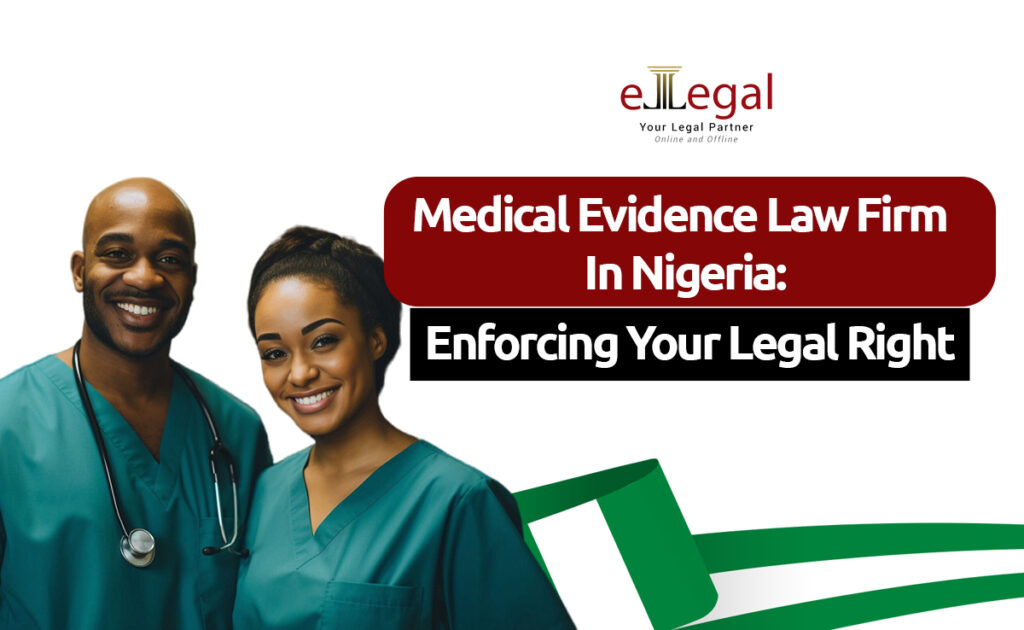Medical negligence, also referred to as medical malpractice could sometimes be referred to as medical misconduct occurs when a healthcare provider fails to meet the standard of care, leading to harm to the patient. It is expected that hospitals, doctors, and other health professionals maintain a specific standard of care, if they fail to meet this standard the patient is the one who suffers the consequences. This could be due to errors in diagnosis, treatment, inadequate aftercare, or mismanagement of health. In Nigeria, there is a growing number of medical negligence cases, mirroring a worldwide pattern where patients are becoming more conscious of their rights and more inclined to pursue justice for inadequate medical treatment. This blog delves into the realm of medical negligence law in Nigeria, the obstacles encountered by victims, and the involvement of law firms in upholding legal rights.
It is worthy of note that not all errors committed by a healthcare professional constitute medical negligence. It would only be considered as such if it warrants criticism from his respected and competent colleagues in the field. The rationale behind this is that every medical procedure carries certain risks, therefore, it would be unjust and contrary to public interest for the healthcare provider to live in a state of perpetual anxiety while carrying out his duties.
What Amounts to Medical Negligence?
Various types of actions or omissions by a medical professional can be considered medical negligence, Some of which include;
Neglecting to remove foreign objects from a patient’s body: This is a common problem in Nigeria, where medical practitioners may unintentionally leave behind swabs, surgical gloves, sponges, or other instruments during surgical procedures. This error can result in further complications or infections. In such instances, the surgeon in charge of the surgery could face consequences for medical malpractice.
Patient’s Consent not obtained before any medical procedure: it is the duty of both hospitals and doctors to obtain prior consent for various purposes, including treatment, organ transplants, disclosure of medical records, and diagnostics. The highest standard of consent is ‘informed consent,’ which is obtained after thoroughly explaining all potential risks and side effects to the patient. Patients must receive sufficient information about the proposed treatment to make an informed decision. Consent can be expressed orally or in writing, implied through the patient’s conduct, tacitly understood, granted by family members as surrogate consent, obtained in advance as advance consent from the patient, or delegated to an authorized person as proxy consent.
Ignorance of patient’s medical history: It is essential for a medical practitioner to gather a thorough medical history in order to effectively diagnose and treat a patient. Failure to do so can result in negligence on the part of the medical professional
Wrong Diagnosis of ailments: Medical professionals must demonstrate reasonable skill and care in examining patients and delivering precise diagnoses. If a medical practitioner provides an incorrect diagnosis, they may be held accountable for medical negligence.
Delay in treatment: It is the responsibility of a medical professional to promptly and effectively attend to a patient’s needs, as failing to do so could lead to medical negligence.
How to Prove Medical Negligence
- To prove medical negligence, four key elements must be established:
- Duty of Care: The healthcare provider owed a duty of care to the patient.
- Breach of Duty: The provider breached this duty by acting or failing to act in a certain way.
- Causation: The breach directly caused harm or injury to the patient.
- Damages: The patient suffered quantifiable harm or loss as a result
The Legal Framework in Nigeria
The Nigerian Constitution
The Nigerian Constitution 1999 (as amended) underpins the right to health and life. Although not explicitly stated as a “right to health”, Section 17(3)(c) mandates the state to ensure that suitable and adequate medical and health facilities are provided for all persons. This provision forms a foundational basis for asserting the right to proper healthcare and, by extension, the right to seek redress in cases of medical negligence.
The Consumer Protection Council Act
The Consumer Protection Council (CPC) Act, Cap C25 Laws of the Federation of Nigeria 2004, provides a statutory framework for consumer protection, including patients. Under this Act, the Council is empowered to eliminate hazardous and substandard goods and services, including medical services, and to provide redress to consumers who suffer from such services. The Act underscores the importance of safe, quality healthcare and serves as a legal tool for patients to seek justice for medical malpractice.
The Medical and Dental Practitioners Act
Cap M8 Laws of the Federation of Nigeria 2004, The Medical and Dental Practitioners Act, regulates the medical profession in Nigeria. The Medical and Dental Council of Nigeria (MDCN) established under this Act is responsible for setting standards for medical practice and disciplining practitioners who breach these standards. The Act provides mechanisms for patients to lodge complaints about medical negligence and for the MDCN to investigate and sanction erring practitioners.
challenges Faced in Medical Negligence Cases
Evaluating professional negligence can be a complex task: The field of medicine is highly complex and demands extensive training to achieve qualification. Judges, lacking medical expertise, must depend on a team of industry professionals to provide insights on whether negligence took place.
Access to Justice: Medical Negligence often requires several years to come to a resolution, during this time legal expenses and additional fees can add up and become a burden to the patient.
Expert Testimony: Medical negligence cases often require expert testimony to establish the standard of care and breach, which can be difficult to obtain.
Risk involved in medical Procedures: Medical treatments always entail some level of risk, and patients should be made aware of this before consenting to a procedure. Unsuccessful treatments do not automatically imply negligence.
Role of Medical Negligence Law Firms
Medical negligence law firms play a crucial role in helping victims navigate these challenges and enforce their legal rights. Their functions include:
- Case Evaluation: Assessing the merits of a potential claim to determine if there is a viable case of medical negligence.
- Evidence Gathering: Collecting medical records, witness statements, and expert opinions to build a strong case.
- Legal Representation: Representing clients in court and during settlement negotiations to ensure they receive fair compensation.
- Advocacy and Support: Providing emotional and practical support to victims throughout the legal process.
Remedies Available to Victims of Medical Negligence
Victims of medical malpractice have several options available to them in seeking justice and holding healthcare providers accountable for their actions. Each option has its own process and requirements, so it is important for victims to carefully consider their choices and seek legal advice to determine the best course of action for their specific situation.
File a complaint under Criminal Law: When individuals harmed by medical malpractice opt to pursue legal action under criminal law, their goal is to ensure accountability from healthcare providers whose actions led to injury or harm. This course of action includes reporting the incident to law enforcement authorities, who will conduct an investigation to assess whether criminal charges are warranted against the party responsible for the incident.
File a civil lawsuit: A victim can decide to sue a doctor or any medical professional for medical negligence or malpractice. This process allows victims to seek compensation for the damages they have suffered as a result of the medical malpractice. This can include medical expenses, lost wages, pain and suffering, and other related costs. The lawsuit will be heard in civil court, where the victim must prove that the healthcare provider’s actions or negligence directly caused their injuries.
Utilize the complaint process provided by the Medical and Dental Practitioner’s Act: This involves filing a formal complaint with the Medical and Dental Council of Nigeria (MDCN). This process allows for an investigation to be conducted into the Medical Professional’s actions, and disciplinary action may be taken if the provider is found to have violated professional standards or ethics.
Steps to Take If You Suspect Medical Negligence
- If you believe you have been a victim of medical negligence, it is crucial to take the following steps:
- Seek Medical Attention: Ensure you receive the necessary medical care to address any harm caused.
- Thorough Documentation: Keep detailed records of your medical treatment, including dates, names of healthcare providers, and the nature of the treatment received.
- Consult a Medical Negligence Lawyer: Seek legal advice to understand your rights and the viability of your claim.
Limitation Period for Medical Negligence Claims
The general limitation period for a medical negligence claim is three years from the date the cause of action occurred. if a person believes they have been a victim of medical negligence, they have three years from the date of the incident to bring a claim against the healthcare provider. However, if the claimant is under a disability at the time of the incident, such as being a minor or mentally incapacitated, they have six years from the date they are no longer under the disability to bring a claim. If the claimant passes away as a result of the medical negligence, their estate has six years from the date of their passing to bring a claim. It’s important for potential claimants to be aware of these limitation periods and seek legal advice as soon as possible if they believe they have been a victim of medical negligence.
Conclusion
The intricate legal system in Nigeria is essential when seeking justice for medical negligence. With the assistance of competent legal counsel, victims can seek recourse for the harm they have suffered. Law firms specializing in medical negligence are crucial in providing the necessary expertise, support, and advocacy for those affected by substandard medical care. We at eLegal Consultants are properly equipped with our team of qualified attorneys to help you out. Contact us now




